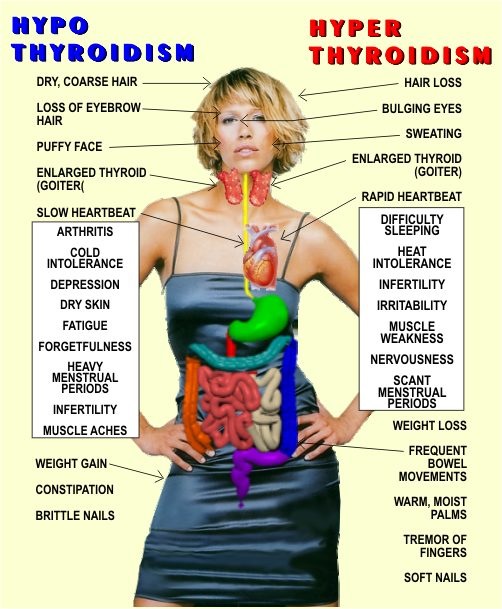Thyroid problems – how to make an early diagnosis
Learning about thyroid problems now can save you a lot of trouble and suffering later. Most thyroid problems can be caught and dealt with early, averting the worst symptoms and bringing your life quickly back under control. The key is knowing what’s happening and what you can do about it.
What is the thyroid gland? It’s an endocrine gland located in your neck, between your Adam’s apple and your collarbone. Like the other endocrine glands, it produces hormones that regulate key aspects of the body’s ability to function. Other endocrine glands include the pineal, which produces melatonin to help us sleep and cycle through seasonal changes, and the islets of Langerhans, clusters of pancreatic cells that produce insulin to process sugar in the bloodstream.
The thyroid produces three hormones that are key to the human body: calcitonin, which limits calcium levels in the blood, and thyroxine and triiodothyronine. The last two manage metabolism and the rates at which many bodily systems grow and function, including how rapidly the body uses energy and makes proteins.
Understanding main thyroid dysfunctions and problems
 A key piece in learning about thyroid symptoms and problems is understanding the two main thyroid dysfunctions: hypothyroidism and hyperthyroidism. The first occurs when the thyroid produces too little of its hormones, the latter when it produces too much.
A key piece in learning about thyroid symptoms and problems is understanding the two main thyroid dysfunctions: hypothyroidism and hyperthyroidism. The first occurs when the thyroid produces too little of its hormones, the latter when it produces too much.
Hypothyroidism is characterised by sensitivity to cold, fatigue, slowed heart rate, weight gain, baldness and memory problems. It can be caused by a number of things including stress, iodine deficiencies, removing the gland during surgery, autoimmune disorders and congenital defects.
Hyperthyroidism Thyroid Symptoms
The other extreme, hyperthyroidism, is characterised by such symptoms as heavy sweating, weight loss, diarrhoea, irritability, muscle weakness, neck goitres, increased appetite, protruding eyes, sensitivity to heat, heart palpitations and sleep disturbances. It’s usually caused by Graves’ disease, an autoimmune condition.
One thing you need to know about thyroid problems is that they often mirror the symptoms of clinical depression. Irritability, fatigue, excessive weight gain or loss, sleep issues and memory problems are all symptoms of thyroid dysfunction and of major depressive disorder.
Thyroid problems can also result from cancer, though thyroid cancer generally causes few symptoms. A neck nodule may appear, followed by pain in the neck and changes to the voice later as the cancer progresses.
There’s a simple way to ease concerns you may have about thyroid problems. If symptoms appear, you can check your thyroid to see if it’s a likely culprit. Just take a few gulps of water with your head tilted back in front of a mirror. If the area between your Adam’s apple and your collarbone bulges or you spot protrusions or any other unusual signs, contact your doctor right away.
If you have questions or concerns about thyroid problems see your local doctor who will arrange for you to see a thyroid surgeon.

